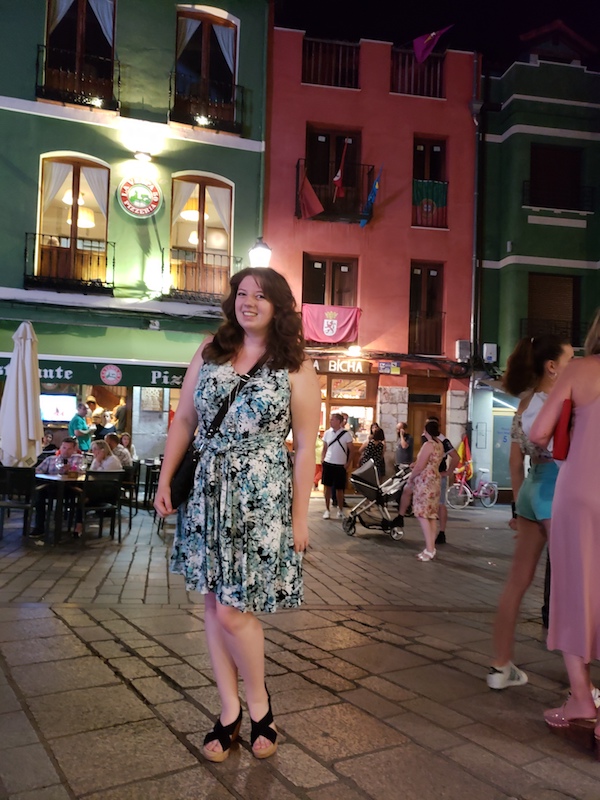ASU grad stayed as busy as the honeybees she studies
Amalie Strang is a Phoenix native and first-generation college student who didn’t want to choose between arts and sciences in college. She graduated this spring majoring in both biological sciences (genetics) and Spanish literature.
During her time at ASU Strang studied honeybees, made time to study abroad and also helped mentor fellow Sun Devils as a community assistant in Barrett, The Honors College.
“My favorite part of the job is when I have worked hard to forge a connection with my residents and then, one day, they'll seek me out to help them with a problem or to show me something they did that they think I would be proud of. It shows me that what I have done has impacted others positively,” she said.

Amalie Strang in León, Spain, during her study abroad in the summer of 2018.
As she prepared to graduate, Strang reflected on her time at ASU, what advice she’d give to continuing students and what the future looks like for her.
Question: What was your “aha” moment, when you realized you wanted to study the field you majored in?
Answer: I always gravitated toward science in high school, but it was the moment when I decided on a specialization that was important to me. I was working on a research essay in AP English in my senior year of high school, and I chose to write about the problems honeybees were facing. The more I researched, the more I fell in love with honeybees!
When looking for sources for that paper, I stumbled across a lab here at ASU that studies honeybees. I reached out to one of the scientists in the lab, and she helped me deepen my understanding of honeybee health. When I got to ASU, I reached out to the principal investigator (the lead scientist) of the lab, Dr. Gro Amdam, to talk about how interested I was in her research.
She offered me a position as an undergraduate researcher, and I've been working in the lab ever since the beginning of my second year, studying the honeybee blood-brain barrier. I completed my honors thesis in this lab, and I have been accepted to the Animal Behavior PhD program at ASU to continue my research on honeybee brains with Dr. Amdam.
Q: What’s something you learned while at ASU — in the classroom or otherwise — that surprised you or changed your perspective?
A: As a first-generation college student, I hadn't thought about my education beyond earning my bachelor’s degree. In my sophomore year, I attended a panel about women in academia sponsored by the Graduate Women's Association. This panel completely changed how I viewed myself and what I was capable of. This was what made me consider going to graduate school and, ultimately, pursue a PhD.
Q: Why did you choose ASU?
A: ASU is a really good fit for me; it was actually the only school I applied to because of what an excellent fit it was. ASU offers great support for first-generation students like me. There’s a great community within the Honors College, and I felt welcomed immediately.
Also, ASU has a fantastic Social Insect Research Group, which is the group the lab I work in belongs to. Because of ASU’s size and diversity of departments, I was able to add a major in Spanish literature and go on a study abroad trip to Spain to support my major.
Q: Which professor taught you the most important lesson while at ASU?
A: My honors thesis advisor, Dr. Amdam, taught me an incredibly important lesson about science and failure. My thesis experiment didn't work the first time around, so we collaborated on changing the experiment and methods so I could finish my project in time.
She taught me that not only is it OK to ask others for help but that, in science, it is encouraged and welcomed. I have so much more confidence going forward into my PhD having learned this.
Q: What’s the best piece of advice you’d give to those still in school?
A: I always like to have a plan for how I see my life going, but through college, I've learned that over-planning can be restricting. For everyone still in school, keep an open mind! You never know if there is going to be an opportunity that is really fulfilling that changes the course of your career.
Q: What was your favorite spot on campus, whether for studying, meeting friends or just thinking about life?
A: My favorite place to study on campus was the basement in Hayden Library. There's something about getting off of that elevator and sitting at those desks that puts me in the right headspace to sit for hours, studying romanticism in Spanish poetry or honeybee genomics.
Q: What are your plans after graduation?
A: I will be pursuing a PhD at ASU in animal behavior. I will be studying honeybee brains in Dr. Gro Amdam's lab. I also plan on creating bilingual outreach programs to bring science to children.
Q: If someone gave you $40 million to solve one problem on our planet, what would you tackle?
A: If I had $40 million to solve a problem on our planet, I would improve the access and the quality of education for marginalized communities. I feel extremely lucky that I was able to attain a college education, and I think it is something that anyone should be able to pursue. Providing children educational support early on in their lives gives them the foundation they need to go to university.